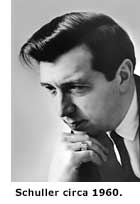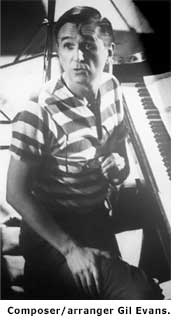Mid-Century Breakthrough: "Third Stream" Music

The declaration of the integration of classical music and jazz, made by Gunther Schuller at Brandeis University in 1957, had somewhat the same effect as the integration of major league baseball at Ebbets Field a decade earlier. There was both praise and controversy—and ultimately more for fans to get excited about.
Schuller, a classically trained German-American composer and French horn player, pushed aside the racial, social, and intellectual differences between these two forms of music in favor of what he dubbed the 'Third Stream.'
Today, at 84, Schuller reflects on what he'd launched during his lectures more than 50 years ago at the then-young and progressive Brandeis campus.

"I had to use about five sub-clauses to describe what the hell I was talking about," he says. "Then I had this silly image that there were two mainstreams of music in the United States"—jazz and classical—"and the first stream was getting married with the second stream and, as the Bible says, begetting a child—the Third Stream.
"The implication was that now was the time to bring together these musics that were totally antithetical and antagonistic to each other. So I came up with a phrase, not expecting anything much from it."
The period of active attention to and creation under the Third Stream name lasted only a half-dozen years, but the musical influence carried on much longer. Within the first year, 1957, Schuller assembled six composers from the first and second streams for the Brandeis University Festival of the Arts (aka the Brandeis Jazz Festival).
Representing the classical stream were Brandeis music chair Harold Shapero, composer Milton Babbitt, and Schuller himself (who also conducted). On the jazz side were Charles Mingus, Jimmy Giuffre, and George Russell. (Mingus and Giuffre were also renown as performers on bass and reeds, respectively, and Giuffre and pianist Bill Evans were among the Festival's ensemble of jazz virtuosos. Russell was also an acclaimed pianist, and the Festival's other conductor.)

Schuller's newly named mission was furthered later in 1957 by his colleague John Lewis, with whom he'd established a Jazz & Classical Music Society a year earlier. Lewis' popular group, the Modern Jazz Quartet, released an LP entitled 'Third Stream Music' (Atlantic), on which Schuller guested alongside Giuffre and the Beaux Arts Trio. The Third Stream quickly flowed further than Schuller had expected, finding points of both resistance and acceptance among mid-century intelligentsia.
"The minute the music changed, there arose a whole new genre of writers on the classical side and on the jazz side who understood and appreciated the new movement," Schuller recounts. "There was also a lot of non-comprehension, and I was attacked on both sides of the fence by critics. They said: you're contaminating these two great musics."
The erudite Schuller had no problem defending his concept. 'Why is this jazz considered some kind of inferior music?' he'd ask the critics. The resistance "of course had racial implications," he recalls, due to the predominance of blacks at jazz's origins in the early 20th century and in the bop and post-bop movements that had shaken up jazz in the '40s and '50s.
But the pushback from critics may have had more to do with Schuller's seeming sanctifying of the 'marriage' than with anything else. The concert-going public itself seemed perfectly comfortable attending live performances of what the critics, but not necessarily the presenters or performers, might label Third Stream. And in any case, the two forms of musical expression, classical and jazz, had been cohabiting for some time, among other places in the compositions of Schuller and California pianist Dave Brubeck, and in the large ensemble arrangements of composer/arranger Gil Evans.

"Just listen to my Octet, around 1946 to '49," points out Brubeck, who turns 90 this year. "All the main guys were combining jazz and classical." And several of them, including Brubeck himself, had studied with classical composer Darius Milhaud at Oakland's Mills College, financed by the GI Bill, after World War II.




